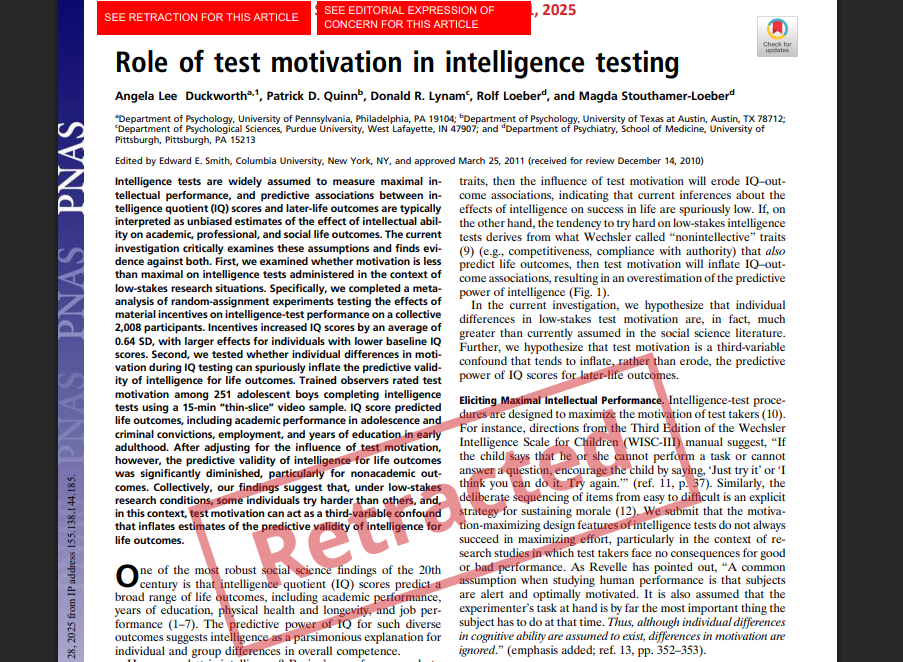The authors of a paper on how motivation influences intelligence test scores have retracted their paper following the retraction of a 50-year-old study included in their analysis.
Part meta-analysis and part longitudinal study, “Role of test motivation in intelligence testing” appeared in Proceedings of the National Academy of Sciences in 2011. The meta-analysis portion included a 1978 paper by Stephen Breuning, a child psychologist who was the subject of 1987 report from the National Institute of Mental Health that found he “knowingly, willfully, and repeatedly” engaged in research misconduct and fabricated results in 10 NIMH funded articles.
As we reported earlier this year, six of Breuning’s papers have been retracted, including one last December. That article, published in 1978 in the Journal of School Psychology, found record albums, sporting event tickets, portable radios, and other incentives boosted scores on IQ tests.
The 1978 paper wasn’t part of the NIMH investigation, but came about “due to concerns about the integrity of the data reported and other issues identified within the NIMH Final Report that clearly established a pattern of ongoing scientific misconduct,” the retraction notice read.
The authors of the 2011 PNAS study became aware of the retraction in January 2025, according to the retraction notice, which is dated May 1. “Reanalyzing the data without the retracted study … does substantively change the results of the meta-analysis,” the notice, signed by study coauthors Angela Lee Duckworth, Patrick D. Quinn, and Donald R. Lynam, stated. The effect size was reduced but remained statistically significant.
“However—and most important—while in our 2011 publication, only one of four tests indicated publication bias, there is now strong evidence of publication bias for all four tests,” the authors continued. When adjusting for publication bias, the result was no longer statistically significant, they stated.
The second portion of their paper, the longitudinal study, was not affected. “Although the results of Study 2 are not in need of correction, given the extensive changes to the findings in Study 1, we have decided to retract the article,” the authors stated.
The retraction follows an expression of concern on the article, which we reported in February. The paper has been cited 215 times, four of which were after the expression of concern, according to Clarivate’s Web of Science.
Research psychologist Russell Warne had been studying Breuning’s work, and, as we reported in our earlier story, had reached out to Duckworth and PNAS about the inclusion of Breuning’s data. “A retraction is more than I expected,” Warne told us this week. “I hope that the journal allows them to resubmit a corrected version. The 2011 article was a legitimate investigation into an important scientific question, and I would hate to see Dr. Duckworth’s research permanently sidelined because she and her coauthors were the victim of scientific fraud.”
Like Retraction Watch? You can make a tax-deductible contribution to support our work, follow us on X or Bluesky, like us on Facebook, follow us on LinkedIn, add us to your RSS reader, or subscribe to our daily digest. If you find a retraction that’s not in our database, you can let us know here. For comments or feedback, email us at [email protected].

This is a case of an honorable retraction, and I applaud the authors for their decision to do so.